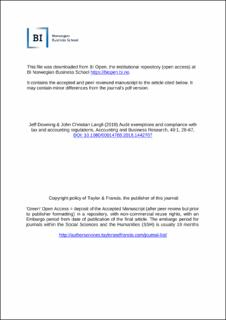Audit exemptions and compliance with tax and accounting regulations
Journal article, Peer reviewed
Accepted version
Permanent lenke
https://hdl.handle.net/11250/2650888Utgivelsesdato
2019Metadata
Vis full innførselSamlinger
- Publikasjoner fra CRIStin - BI [1015]
- Scientific articles [2181]
Originalversjon
Accounting and Business Research. 2019, 49 (1), 28-67. 10.1080/00014788.2018.1442707Sammendrag
We examine small firms’ compliance with tax and accounting regulations before and after a change in the threshold for mandatory auditing. Prior to 2011, all Norwegian firms were required to be audited. In 2011, a law change allowed small Norwegian firms to choose not to be audited. After this change, the Norwegian Directorate of Taxes conducted on- and off-site inspections of a representative sample of 2117 Norwegian firms, with a focus on compliance with specific requirements in tax and accounting regulation. We use the results from these inspections to construct a compliance quality score (CQS). We find that the firms that chose to opt out of auditing have lower CQS than do firms that chose to continue to be audited; that the CQS of firms that chose not to be audited declined after opting out; and that some of the opt-out firms fully mitigated the decline in CQS by engaging external accountants or auditors to prepare their annual financial statements. The results should be of interest to regulators considering increasing the thresholds for mandatory auditing, as our results show that (i) firms that choose not to be audited can experience a decline in CQS after opting out and (ii) CQS can be maintained at the same level as before if opt-out firms engage external consultants that assist in preparing the annual accounts.
